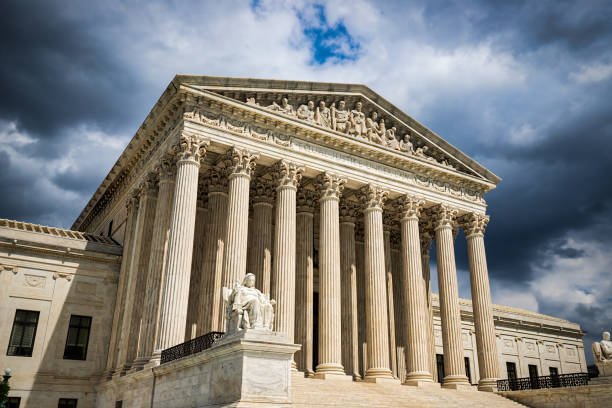The Supreme Court’s recent leaked draft opinion in the case of Dobbs v. Jackson Women’s Health Organization has stirred conversations among American Muslims as it has among other religious groups. As an American Muslim, I have pondered over its impact on my faith community, and on the issue of sin vs. crime.
Where do American Muslims stand on this issue? According to “American Muslim Poll” a report issued by the Institute for Social Policy and Understanding (ISPU), an organization that provides research and education about American Muslims, 56% of American Muslims and 55% of American Catholics believe that abortion should be legal in all or most cases. Amongst the Muslims polled, men were on par with women in their view.
Had I been polled on the legality of abortion I would have said: abortion should be legal in most cases. As an American I believe in the separation of church and state, and to the extent the movement to overturn Roe v. Wade is driven by religious conviction, I am opposed to any one faith imposing its belief on an entire nation.
But if I was asked: “Where does Islam stand on abortion?” my answer would be: “It depends on who you ask.”
The concept of clerical hierarchy—the equivalent of a pope and cardinals—does not exist in the Sunni tradition, which constitutes 85% of the Muslims worldwide. Hence there is no one position on this issue, and opinions of scholars are non-binding. According to the Islamic belief, I have a direct relationship with God and whereas I will take a scholar’s opinion under advisement, I am not bound by it. However, most Muslims will follow the guidance of a particular school of thought that their community conforms to.
Among the major schools of thought in both the Sunni and Shi’ite traditions, there is agreement that abortion is permitted at any stage of the pregnancy if the mother’s life is at risk. Opinions differ on whether other reasons for abortion are permitted and at what stage of pregnancy. Scholars opine based on their interpretation of two sources: the shari’a, derived from the Qur’an, and the hadith (saying by Prophet Muhammad).
One of the objectives of the shari’a is protection of life (Quran 5:32, 17:31). That raises the question: When does life begin? According to the hadith, ensoulment of a fetus takes place at 120 days of gestation. As stated by Abed Awad, a Rutgers adjunct law professor and national expert in shari’a/Islamic law, “majority of medieval Muslim scholars allowed women to terminate a pregnancy before 120 days.” Medieval scholars considered theological conception (ensoulment) as the start of life as opposed to conception defined by science. Hence termination prior to 120 days is not termination of a life. Whereas this remains the view of the majority today, not all schools of thought embrace this edict. They differ on the stage at which abortion can be performed, some permitting it up to 40 days.
In the modern age, opinions have evolved based on advances in science and social considerations. The International Islamic Fiqh Council has ruled that termination of pregnancy can be permitted before 120 days if there are fetal anomalies. Muslim-majority countries have developed their own criteria for the nature of fetal abnormality eligible for abortion. In Pakistan, the country of my origin, abortion is permitted within 19 weeks of gestation if a fetal abnormality is detected, but excludes Down Syndrome. During the war in Bosnia, some scholars allowed rape victims to abort the fetus. In Iran, the Ayatollah issued a fatwa permitting abortion in the first three months for poverty and overpopulation, stating compassion as the rationale.
Whereas these varying opinions can be source of confusion, in general, Islam takes a moderate view allowing room for extenuating circumstances.
Should Roe v. Wade be overturned, Muslim women and Muslim healthcare providers who embrace a moderate view on abortion, will be prevented from seeking or providing services. And that raises the issue of sin vs. crime.
If I believe that life begins at 120 days, then aborting the fetus after 120 days is a sin, as I am violating God’s commandment (unless my life is at risk). The consequences of my deed is between me and God and I am accountable to Him alone. It is not the place of governmental authority to intervene and criminalize the act. But if early-stage abortion is made illegal, what was not a sin becomes a crime, punishable by law. Where would that circumstance leave American Muslims who believe in the permissibility of early-stage abortion? According to the shari’a, Muslims are obligated to comply with the law of the land. Their option: respect the law.
Order here:
At a bookstore near you
and
Amazon (hard cover) Amazon (Kindle)
Barnes & Noble Bookshop.org
Indiebound Books-a-Million
Order from:
A bookstore near you
and
Amazon (hardcover) Amazon (Kindle) Bookshop.org Barnes & Noble Indiebound
Books-A-Million Target.com Walmart.com
Order here on Amazon for your:
Paperback
Kindle
Hardcover
Audio, narrated by Yours Truly
Or look for it on the shelf of your neighborhood bookstore.
As an Amazon Associate, I earn from qualifying purchases




